Healthcare Ethics: Ethical Dilemma Analysis and Decision-Making
VerifiedAdded on 2023/04/05
|8
|1800
|382
Report
AI Summary
This report presents a healthcare ethics case study involving a medical doctor impaired by substance abuse. The student, acting as a health service manager, utilizes the Markkula Centre for Applied Ethics framework to navigate the ethical dilemma. The analysis considers five ethical standards: utilitarianism, rights, fairness/justice, the common good, and virtue. The report explores how each standard influences the decision-making process, weighing the consequences of reporting the doctor versus seeking psychiatric help. The student ultimately proposes a course of action that aims to benefit the doctor, patients, and the hospital's reputation. The report concludes by emphasizing the importance of ethical frameworks in addressing complex healthcare challenges and the need to balance various ethical considerations to arrive at the most appropriate decision.
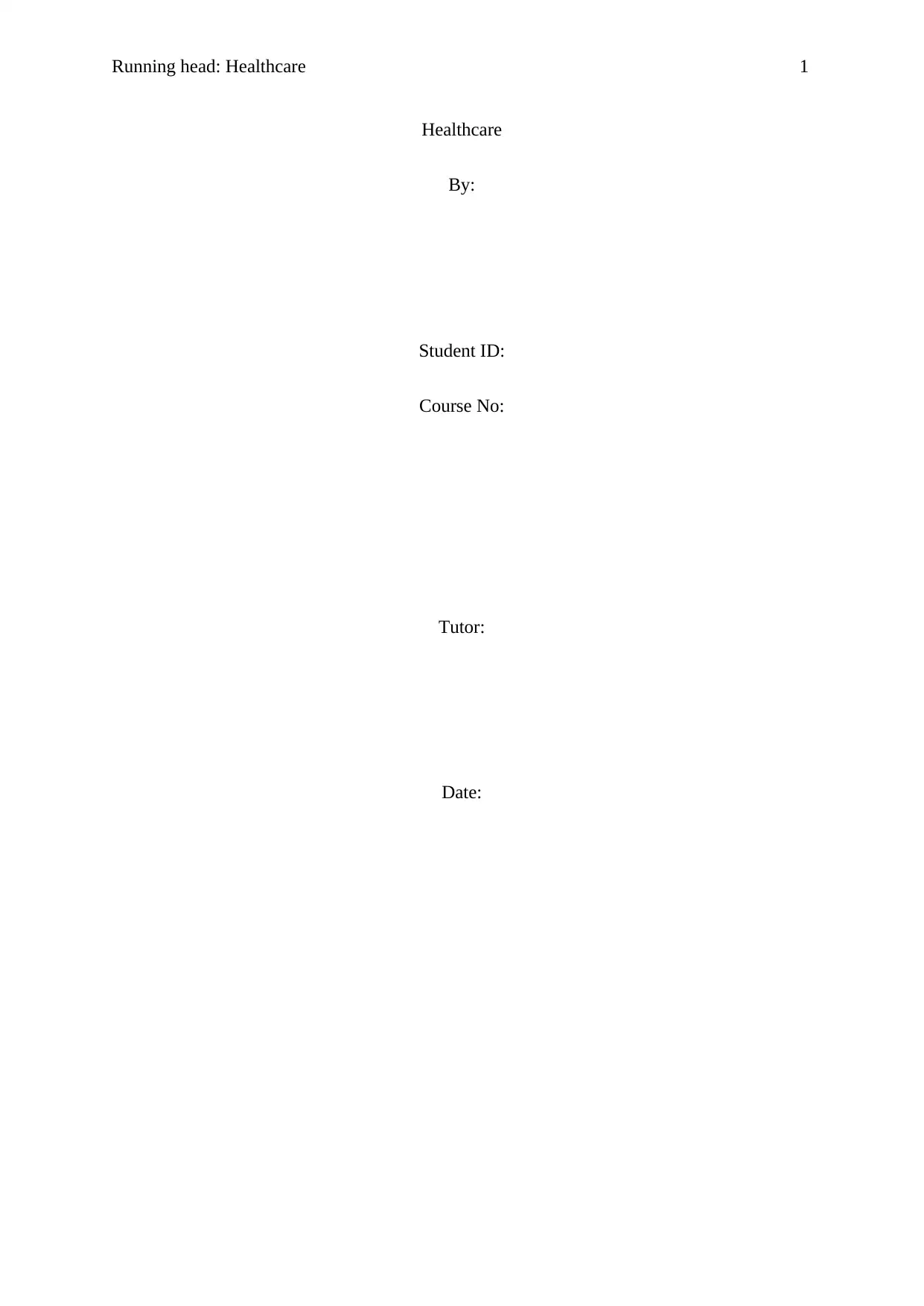
Running head: Healthcare 1
Healthcare
By:
Student ID:
Course No:
Tutor:
Date:
Healthcare
By:
Student ID:
Course No:
Tutor:
Date:
Paraphrase This Document
Need a fresh take? Get an instant paraphrase of this document with our AI Paraphraser
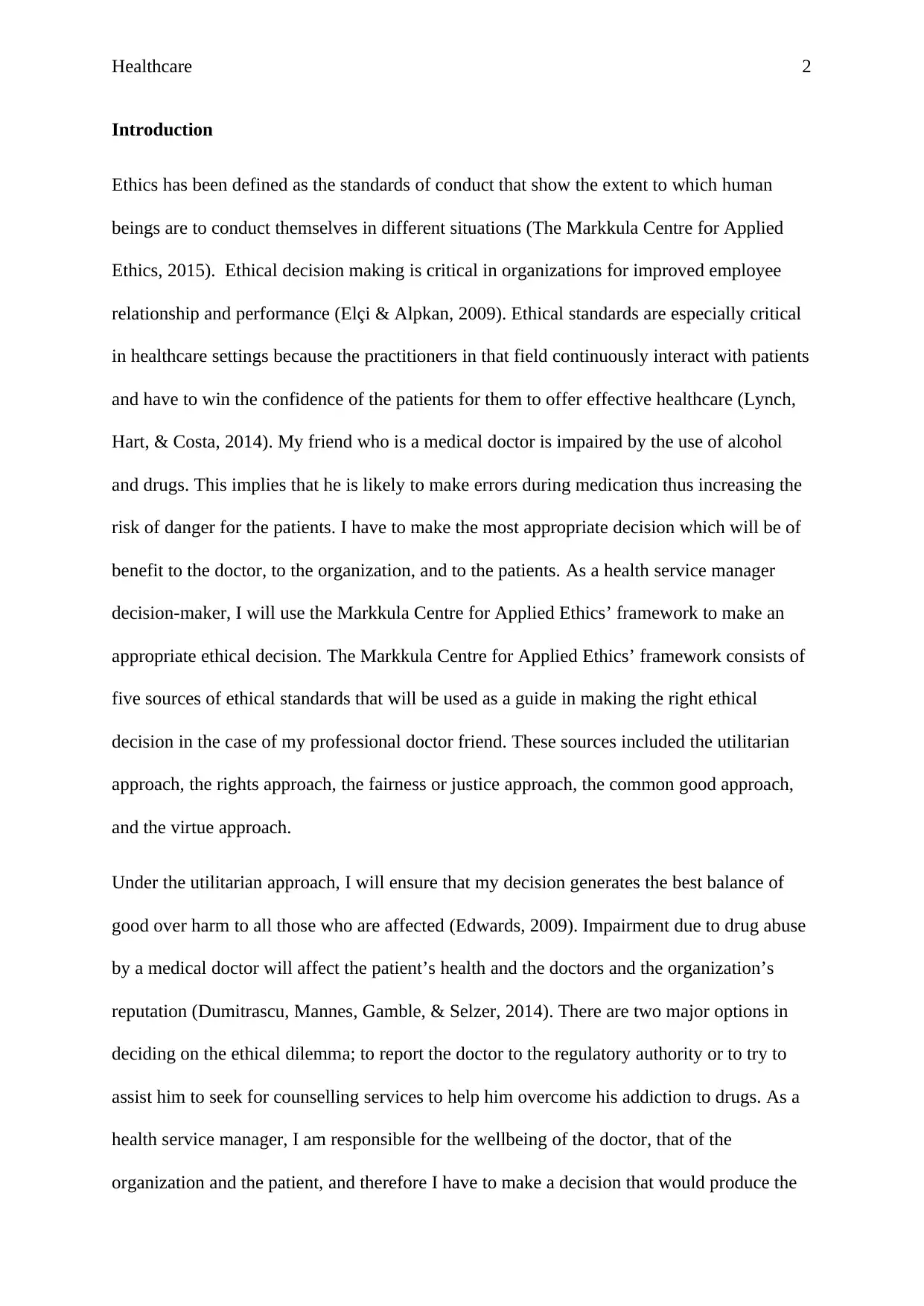
Healthcare 2
Introduction
Ethics has been defined as the standards of conduct that show the extent to which human
beings are to conduct themselves in different situations (The Markkula Centre for Applied
Ethics, 2015). Ethical decision making is critical in organizations for improved employee
relationship and performance (Elçi & Alpkan, 2009). Ethical standards are especially critical
in healthcare settings because the practitioners in that field continuously interact with patients
and have to win the confidence of the patients for them to offer effective healthcare (Lynch,
Hart, & Costa, 2014). My friend who is a medical doctor is impaired by the use of alcohol
and drugs. This implies that he is likely to make errors during medication thus increasing the
risk of danger for the patients. I have to make the most appropriate decision which will be of
benefit to the doctor, to the organization, and to the patients. As a health service manager
decision-maker, I will use the Markkula Centre for Applied Ethics’ framework to make an
appropriate ethical decision. The Markkula Centre for Applied Ethics’ framework consists of
five sources of ethical standards that will be used as a guide in making the right ethical
decision in the case of my professional doctor friend. These sources included the utilitarian
approach, the rights approach, the fairness or justice approach, the common good approach,
and the virtue approach.
Under the utilitarian approach, I will ensure that my decision generates the best balance of
good over harm to all those who are affected (Edwards, 2009). Impairment due to drug abuse
by a medical doctor will affect the patient’s health and the doctors and the organization’s
reputation (Dumitrascu, Mannes, Gamble, & Selzer, 2014). There are two major options in
deciding on the ethical dilemma; to report the doctor to the regulatory authority or to try to
assist him to seek for counselling services to help him overcome his addiction to drugs. As a
health service manager, I am responsible for the wellbeing of the doctor, that of the
organization and the patient, and therefore I have to make a decision that would produce the
Introduction
Ethics has been defined as the standards of conduct that show the extent to which human
beings are to conduct themselves in different situations (The Markkula Centre for Applied
Ethics, 2015). Ethical decision making is critical in organizations for improved employee
relationship and performance (Elçi & Alpkan, 2009). Ethical standards are especially critical
in healthcare settings because the practitioners in that field continuously interact with patients
and have to win the confidence of the patients for them to offer effective healthcare (Lynch,
Hart, & Costa, 2014). My friend who is a medical doctor is impaired by the use of alcohol
and drugs. This implies that he is likely to make errors during medication thus increasing the
risk of danger for the patients. I have to make the most appropriate decision which will be of
benefit to the doctor, to the organization, and to the patients. As a health service manager
decision-maker, I will use the Markkula Centre for Applied Ethics’ framework to make an
appropriate ethical decision. The Markkula Centre for Applied Ethics’ framework consists of
five sources of ethical standards that will be used as a guide in making the right ethical
decision in the case of my professional doctor friend. These sources included the utilitarian
approach, the rights approach, the fairness or justice approach, the common good approach,
and the virtue approach.
Under the utilitarian approach, I will ensure that my decision generates the best balance of
good over harm to all those who are affected (Edwards, 2009). Impairment due to drug abuse
by a medical doctor will affect the patient’s health and the doctors and the organization’s
reputation (Dumitrascu, Mannes, Gamble, & Selzer, 2014). There are two major options in
deciding on the ethical dilemma; to report the doctor to the regulatory authority or to try to
assist him to seek for counselling services to help him overcome his addiction to drugs. As a
health service manager, I am responsible for the wellbeing of the doctor, that of the
organization and the patient, and therefore I have to make a decision that would produce the
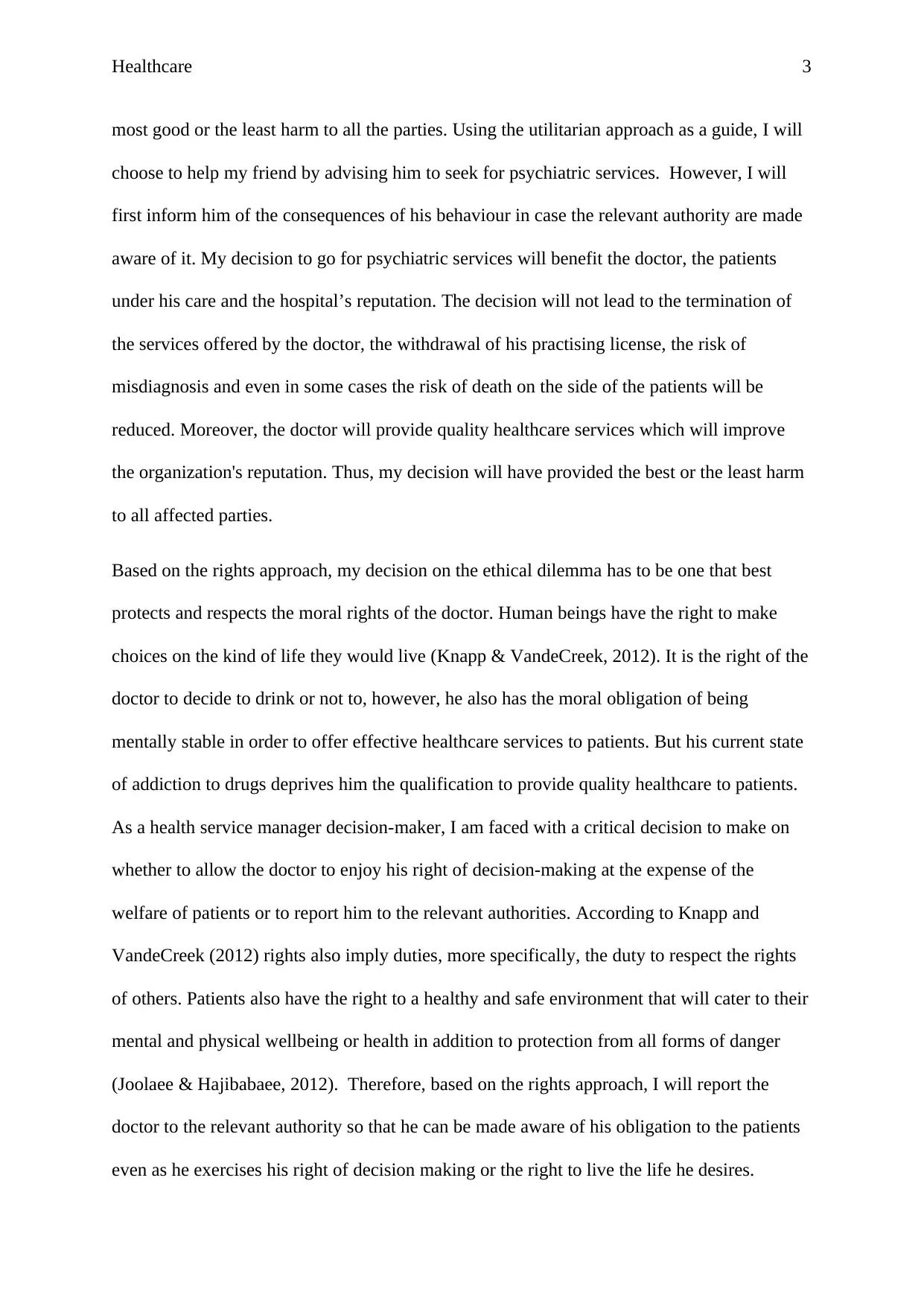
Healthcare 3
most good or the least harm to all the parties. Using the utilitarian approach as a guide, I will
choose to help my friend by advising him to seek for psychiatric services. However, I will
first inform him of the consequences of his behaviour in case the relevant authority are made
aware of it. My decision to go for psychiatric services will benefit the doctor, the patients
under his care and the hospital’s reputation. The decision will not lead to the termination of
the services offered by the doctor, the withdrawal of his practising license, the risk of
misdiagnosis and even in some cases the risk of death on the side of the patients will be
reduced. Moreover, the doctor will provide quality healthcare services which will improve
the organization's reputation. Thus, my decision will have provided the best or the least harm
to all affected parties.
Based on the rights approach, my decision on the ethical dilemma has to be one that best
protects and respects the moral rights of the doctor. Human beings have the right to make
choices on the kind of life they would live (Knapp & VandeCreek, 2012). It is the right of the
doctor to decide to drink or not to, however, he also has the moral obligation of being
mentally stable in order to offer effective healthcare services to patients. But his current state
of addiction to drugs deprives him the qualification to provide quality healthcare to patients.
As a health service manager decision-maker, I am faced with a critical decision to make on
whether to allow the doctor to enjoy his right of decision-making at the expense of the
welfare of patients or to report him to the relevant authorities. According to Knapp and
VandeCreek (2012) rights also imply duties, more specifically, the duty to respect the rights
of others. Patients also have the right to a healthy and safe environment that will cater to their
mental and physical wellbeing or health in addition to protection from all forms of danger
(Joolaee & Hajibabaee, 2012). Therefore, based on the rights approach, I will report the
doctor to the relevant authority so that he can be made aware of his obligation to the patients
even as he exercises his right of decision making or the right to live the life he desires.
most good or the least harm to all the parties. Using the utilitarian approach as a guide, I will
choose to help my friend by advising him to seek for psychiatric services. However, I will
first inform him of the consequences of his behaviour in case the relevant authority are made
aware of it. My decision to go for psychiatric services will benefit the doctor, the patients
under his care and the hospital’s reputation. The decision will not lead to the termination of
the services offered by the doctor, the withdrawal of his practising license, the risk of
misdiagnosis and even in some cases the risk of death on the side of the patients will be
reduced. Moreover, the doctor will provide quality healthcare services which will improve
the organization's reputation. Thus, my decision will have provided the best or the least harm
to all affected parties.
Based on the rights approach, my decision on the ethical dilemma has to be one that best
protects and respects the moral rights of the doctor. Human beings have the right to make
choices on the kind of life they would live (Knapp & VandeCreek, 2012). It is the right of the
doctor to decide to drink or not to, however, he also has the moral obligation of being
mentally stable in order to offer effective healthcare services to patients. But his current state
of addiction to drugs deprives him the qualification to provide quality healthcare to patients.
As a health service manager decision-maker, I am faced with a critical decision to make on
whether to allow the doctor to enjoy his right of decision-making at the expense of the
welfare of patients or to report him to the relevant authorities. According to Knapp and
VandeCreek (2012) rights also imply duties, more specifically, the duty to respect the rights
of others. Patients also have the right to a healthy and safe environment that will cater to their
mental and physical wellbeing or health in addition to protection from all forms of danger
(Joolaee & Hajibabaee, 2012). Therefore, based on the rights approach, I will report the
doctor to the relevant authority so that he can be made aware of his obligation to the patients
even as he exercises his right of decision making or the right to live the life he desires.
⊘ This is a preview!⊘
Do you want full access?
Subscribe today to unlock all pages.

Trusted by 1+ million students worldwide
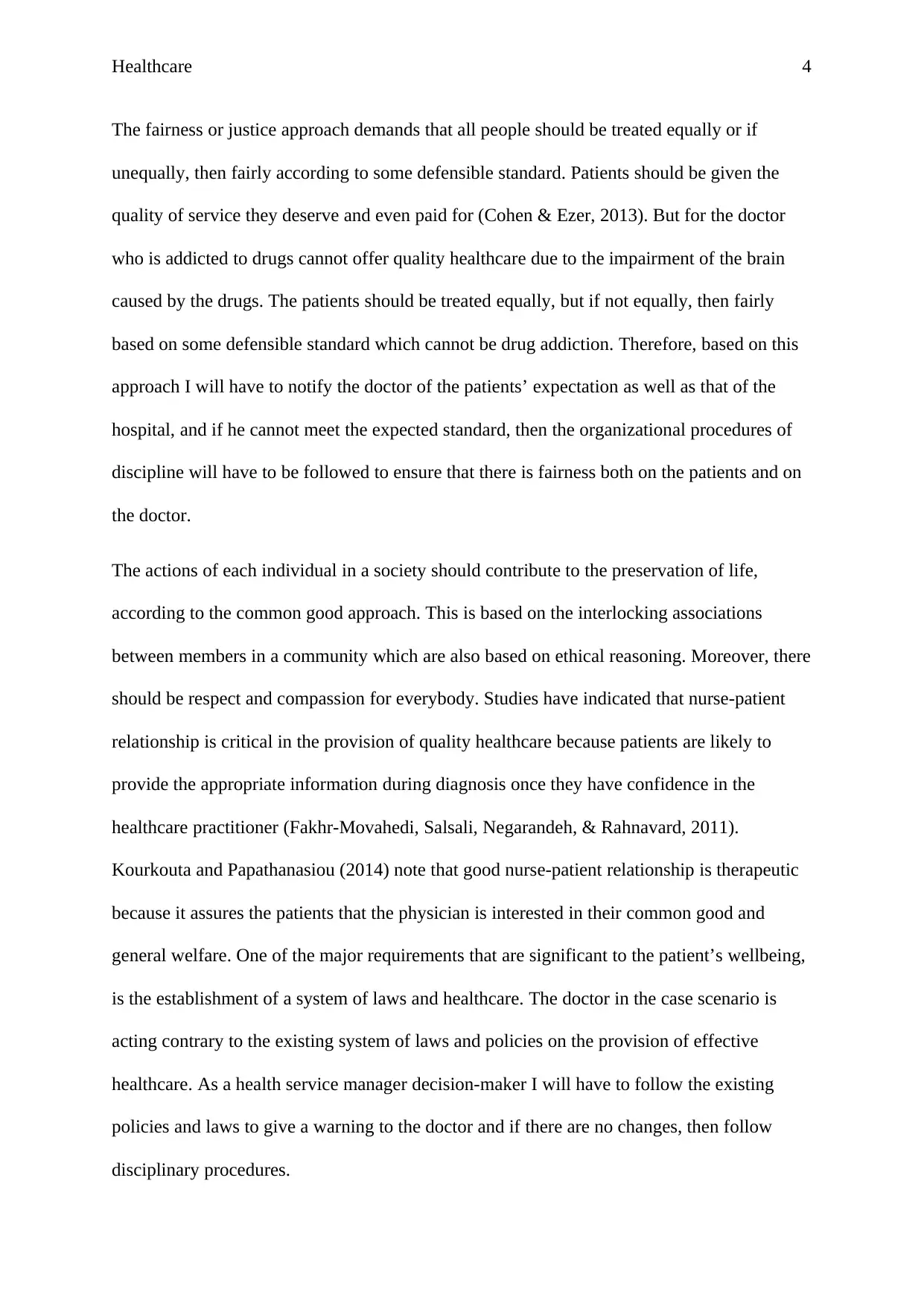
Healthcare 4
The fairness or justice approach demands that all people should be treated equally or if
unequally, then fairly according to some defensible standard. Patients should be given the
quality of service they deserve and even paid for (Cohen & Ezer, 2013). But for the doctor
who is addicted to drugs cannot offer quality healthcare due to the impairment of the brain
caused by the drugs. The patients should be treated equally, but if not equally, then fairly
based on some defensible standard which cannot be drug addiction. Therefore, based on this
approach I will have to notify the doctor of the patients’ expectation as well as that of the
hospital, and if he cannot meet the expected standard, then the organizational procedures of
discipline will have to be followed to ensure that there is fairness both on the patients and on
the doctor.
The actions of each individual in a society should contribute to the preservation of life,
according to the common good approach. This is based on the interlocking associations
between members in a community which are also based on ethical reasoning. Moreover, there
should be respect and compassion for everybody. Studies have indicated that nurse-patient
relationship is critical in the provision of quality healthcare because patients are likely to
provide the appropriate information during diagnosis once they have confidence in the
healthcare practitioner (Fakhr-Movahedi, Salsali, Negarandeh, & Rahnavard, 2011).
Kourkouta and Papathanasiou (2014) note that good nurse-patient relationship is therapeutic
because it assures the patients that the physician is interested in their common good and
general welfare. One of the major requirements that are significant to the patient’s wellbeing,
is the establishment of a system of laws and healthcare. The doctor in the case scenario is
acting contrary to the existing system of laws and policies on the provision of effective
healthcare. As a health service manager decision-maker I will have to follow the existing
policies and laws to give a warning to the doctor and if there are no changes, then follow
disciplinary procedures.
The fairness or justice approach demands that all people should be treated equally or if
unequally, then fairly according to some defensible standard. Patients should be given the
quality of service they deserve and even paid for (Cohen & Ezer, 2013). But for the doctor
who is addicted to drugs cannot offer quality healthcare due to the impairment of the brain
caused by the drugs. The patients should be treated equally, but if not equally, then fairly
based on some defensible standard which cannot be drug addiction. Therefore, based on this
approach I will have to notify the doctor of the patients’ expectation as well as that of the
hospital, and if he cannot meet the expected standard, then the organizational procedures of
discipline will have to be followed to ensure that there is fairness both on the patients and on
the doctor.
The actions of each individual in a society should contribute to the preservation of life,
according to the common good approach. This is based on the interlocking associations
between members in a community which are also based on ethical reasoning. Moreover, there
should be respect and compassion for everybody. Studies have indicated that nurse-patient
relationship is critical in the provision of quality healthcare because patients are likely to
provide the appropriate information during diagnosis once they have confidence in the
healthcare practitioner (Fakhr-Movahedi, Salsali, Negarandeh, & Rahnavard, 2011).
Kourkouta and Papathanasiou (2014) note that good nurse-patient relationship is therapeutic
because it assures the patients that the physician is interested in their common good and
general welfare. One of the major requirements that are significant to the patient’s wellbeing,
is the establishment of a system of laws and healthcare. The doctor in the case scenario is
acting contrary to the existing system of laws and policies on the provision of effective
healthcare. As a health service manager decision-maker I will have to follow the existing
policies and laws to give a warning to the doctor and if there are no changes, then follow
disciplinary procedures.
Paraphrase This Document
Need a fresh take? Get an instant paraphrase of this document with our AI Paraphraser
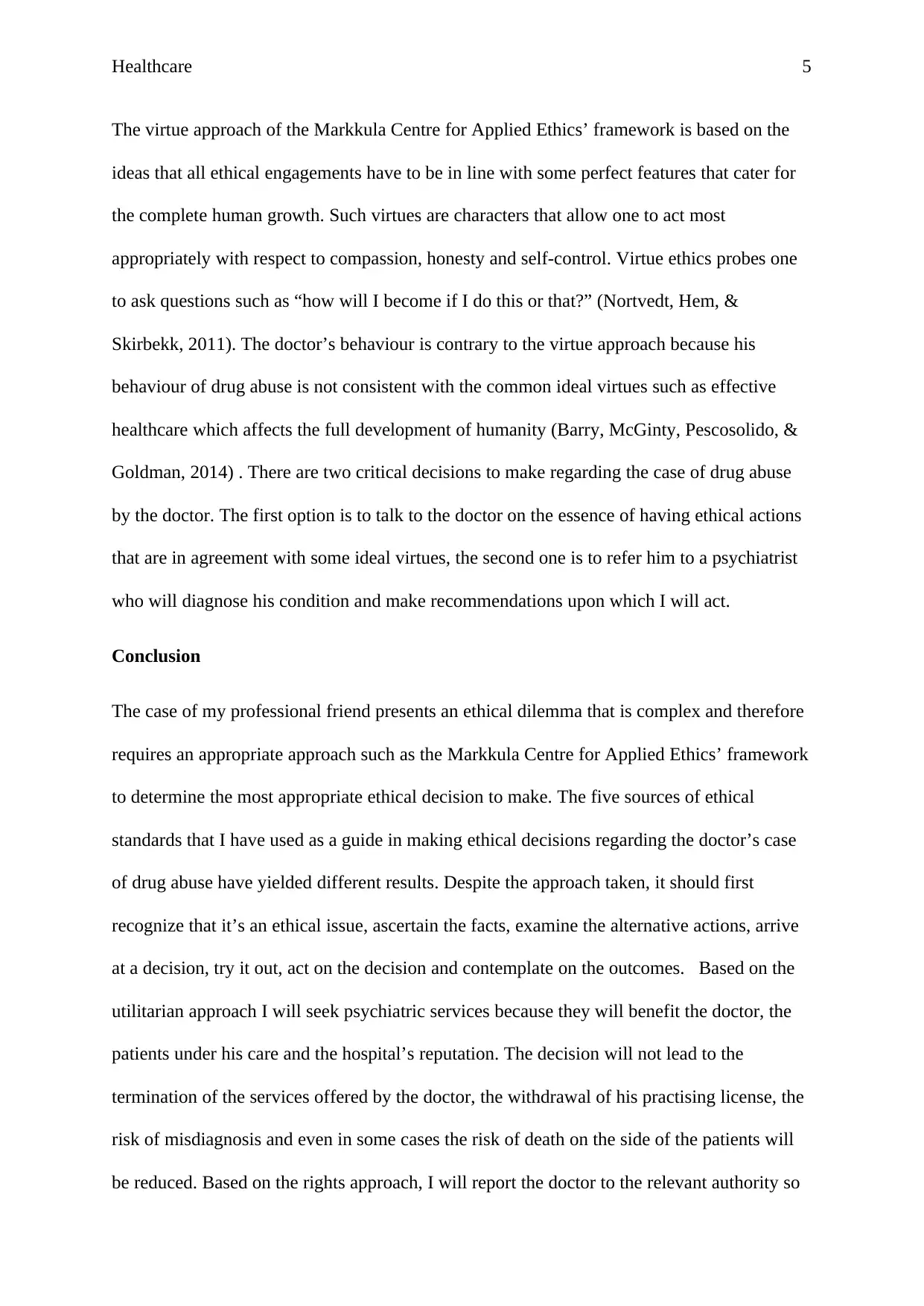
Healthcare 5
The virtue approach of the Markkula Centre for Applied Ethics’ framework is based on the
ideas that all ethical engagements have to be in line with some perfect features that cater for
the complete human growth. Such virtues are characters that allow one to act most
appropriately with respect to compassion, honesty and self-control. Virtue ethics probes one
to ask questions such as “how will I become if I do this or that?” (Nortvedt, Hem, &
Skirbekk, 2011). The doctor’s behaviour is contrary to the virtue approach because his
behaviour of drug abuse is not consistent with the common ideal virtues such as effective
healthcare which affects the full development of humanity (Barry, McGinty, Pescosolido, &
Goldman, 2014) . There are two critical decisions to make regarding the case of drug abuse
by the doctor. The first option is to talk to the doctor on the essence of having ethical actions
that are in agreement with some ideal virtues, the second one is to refer him to a psychiatrist
who will diagnose his condition and make recommendations upon which I will act.
Conclusion
The case of my professional friend presents an ethical dilemma that is complex and therefore
requires an appropriate approach such as the Markkula Centre for Applied Ethics’ framework
to determine the most appropriate ethical decision to make. The five sources of ethical
standards that I have used as a guide in making ethical decisions regarding the doctor’s case
of drug abuse have yielded different results. Despite the approach taken, it should first
recognize that it’s an ethical issue, ascertain the facts, examine the alternative actions, arrive
at a decision, try it out, act on the decision and contemplate on the outcomes. Based on the
utilitarian approach I will seek psychiatric services because they will benefit the doctor, the
patients under his care and the hospital’s reputation. The decision will not lead to the
termination of the services offered by the doctor, the withdrawal of his practising license, the
risk of misdiagnosis and even in some cases the risk of death on the side of the patients will
be reduced. Based on the rights approach, I will report the doctor to the relevant authority so
The virtue approach of the Markkula Centre for Applied Ethics’ framework is based on the
ideas that all ethical engagements have to be in line with some perfect features that cater for
the complete human growth. Such virtues are characters that allow one to act most
appropriately with respect to compassion, honesty and self-control. Virtue ethics probes one
to ask questions such as “how will I become if I do this or that?” (Nortvedt, Hem, &
Skirbekk, 2011). The doctor’s behaviour is contrary to the virtue approach because his
behaviour of drug abuse is not consistent with the common ideal virtues such as effective
healthcare which affects the full development of humanity (Barry, McGinty, Pescosolido, &
Goldman, 2014) . There are two critical decisions to make regarding the case of drug abuse
by the doctor. The first option is to talk to the doctor on the essence of having ethical actions
that are in agreement with some ideal virtues, the second one is to refer him to a psychiatrist
who will diagnose his condition and make recommendations upon which I will act.
Conclusion
The case of my professional friend presents an ethical dilemma that is complex and therefore
requires an appropriate approach such as the Markkula Centre for Applied Ethics’ framework
to determine the most appropriate ethical decision to make. The five sources of ethical
standards that I have used as a guide in making ethical decisions regarding the doctor’s case
of drug abuse have yielded different results. Despite the approach taken, it should first
recognize that it’s an ethical issue, ascertain the facts, examine the alternative actions, arrive
at a decision, try it out, act on the decision and contemplate on the outcomes. Based on the
utilitarian approach I will seek psychiatric services because they will benefit the doctor, the
patients under his care and the hospital’s reputation. The decision will not lead to the
termination of the services offered by the doctor, the withdrawal of his practising license, the
risk of misdiagnosis and even in some cases the risk of death on the side of the patients will
be reduced. Based on the rights approach, I will report the doctor to the relevant authority so
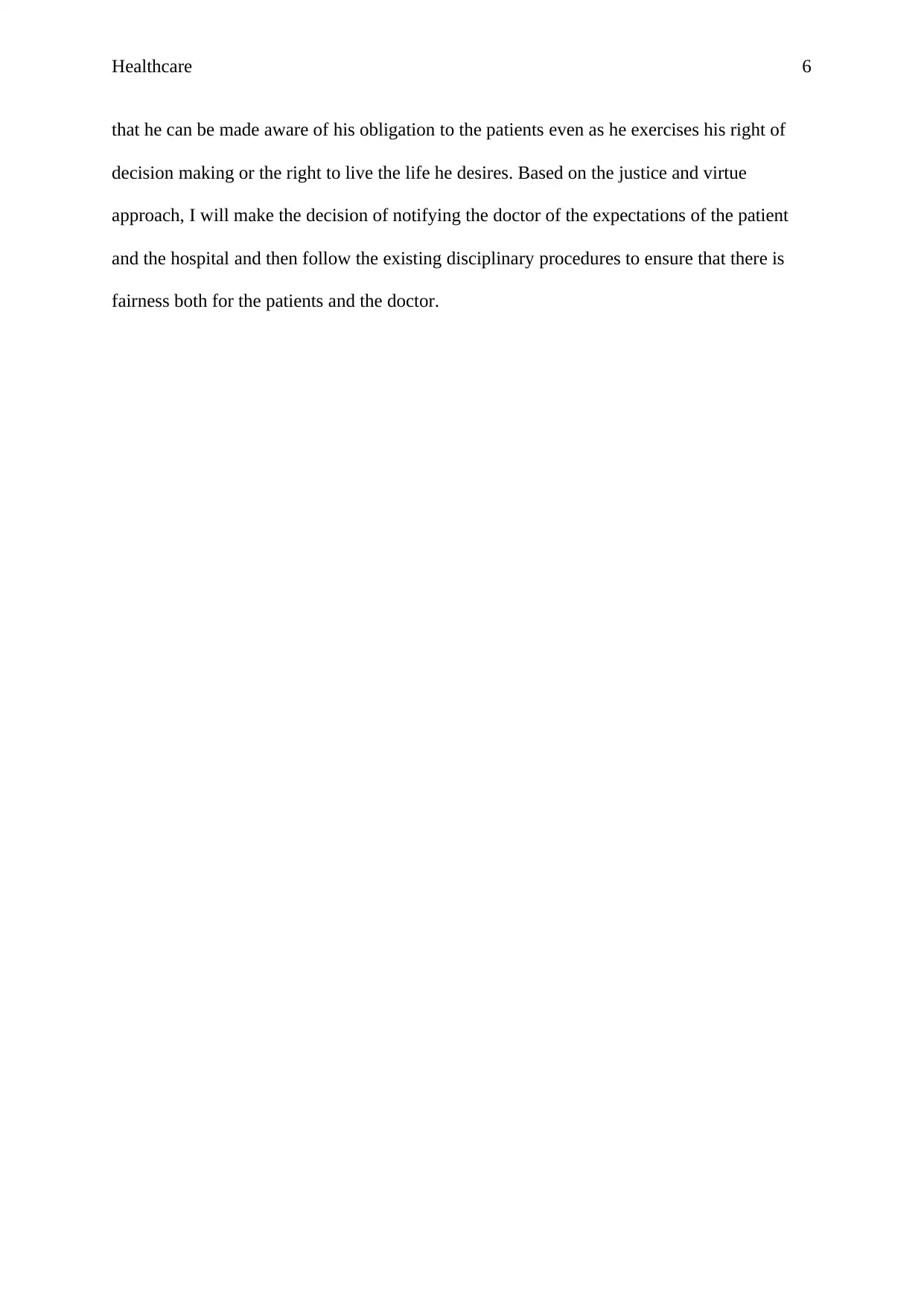
Healthcare 6
that he can be made aware of his obligation to the patients even as he exercises his right of
decision making or the right to live the life he desires. Based on the justice and virtue
approach, I will make the decision of notifying the doctor of the expectations of the patient
and the hospital and then follow the existing disciplinary procedures to ensure that there is
fairness both for the patients and the doctor.
that he can be made aware of his obligation to the patients even as he exercises his right of
decision making or the right to live the life he desires. Based on the justice and virtue
approach, I will make the decision of notifying the doctor of the expectations of the patient
and the hospital and then follow the existing disciplinary procedures to ensure that there is
fairness both for the patients and the doctor.
⊘ This is a preview!⊘
Do you want full access?
Subscribe today to unlock all pages.

Trusted by 1+ million students worldwide
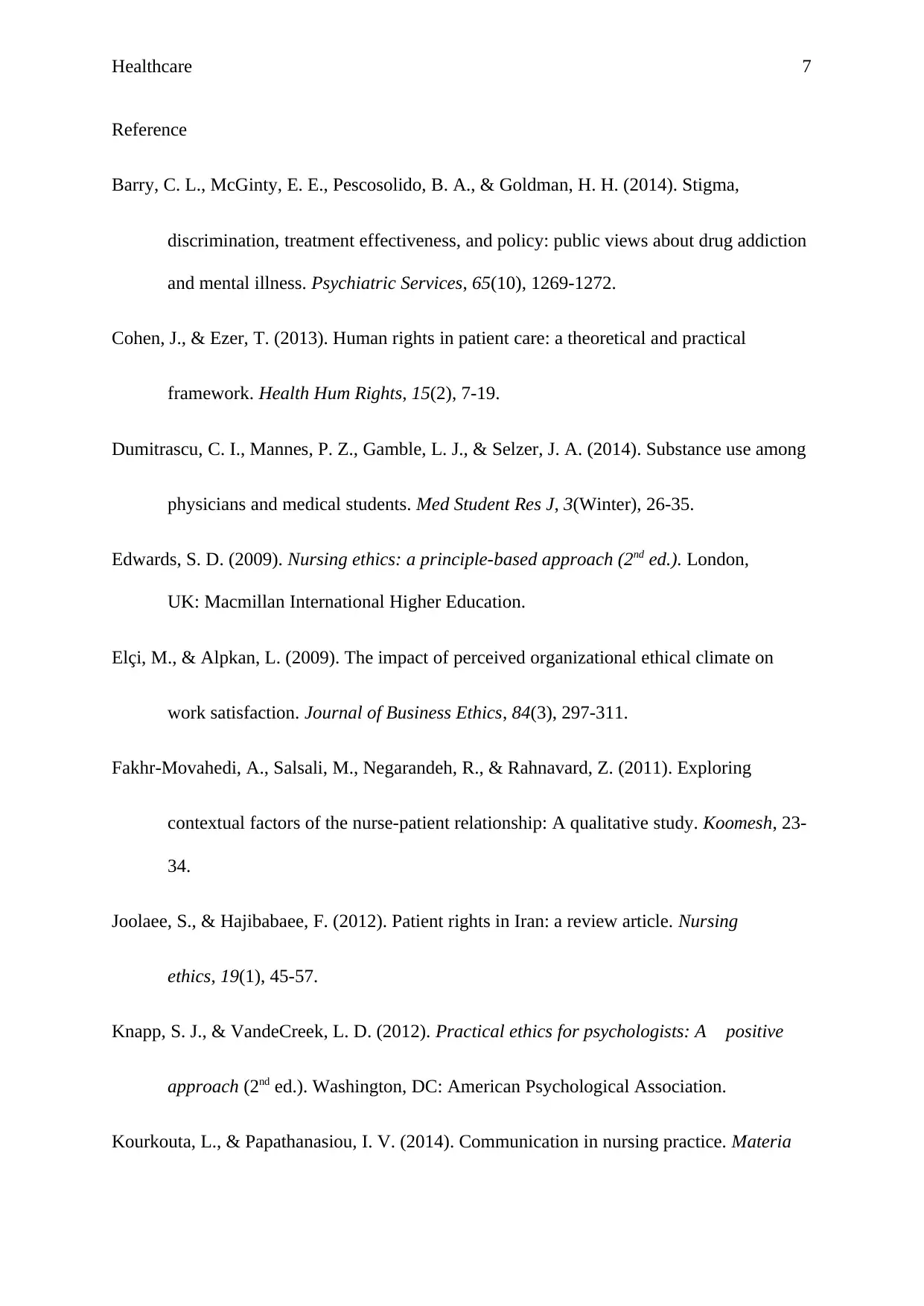
Healthcare 7
Reference
Barry, C. L., McGinty, E. E., Pescosolido, B. A., & Goldman, H. H. (2014). Stigma,
discrimination, treatment effectiveness, and policy: public views about drug addiction
and mental illness. Psychiatric Services, 65(10), 1269-1272.
Cohen, J., & Ezer, T. (2013). Human rights in patient care: a theoretical and practical
framework. Health Hum Rights, 15(2), 7-19.
Dumitrascu, C. I., Mannes, P. Z., Gamble, L. J., & Selzer, J. A. (2014). Substance use among
physicians and medical students. Med Student Res J, 3(Winter), 26-35.
Edwards, S. D. (2009). Nursing ethics: a principle-based approach (2nd ed.). London,
UK: Macmillan International Higher Education.
Elçi, M., & Alpkan, L. (2009). The impact of perceived organizational ethical climate on
work satisfaction. Journal of Business Ethics, 84(3), 297-311.
Fakhr-Movahedi, A., Salsali, M., Negarandeh, R., & Rahnavard, Z. (2011). Exploring
contextual factors of the nurse-patient relationship: A qualitative study. Koomesh, 23-
34.
Joolaee, S., & Hajibabaee, F. (2012). Patient rights in Iran: a review article. Nursing
ethics, 19(1), 45-57.
Knapp, S. J., & VandeCreek, L. D. (2012). Practical ethics for psychologists: A positive
approach (2nd ed.). Washington, DC: American Psychological Association.
Kourkouta, L., & Papathanasiou, I. V. (2014). Communication in nursing practice. Materia
Reference
Barry, C. L., McGinty, E. E., Pescosolido, B. A., & Goldman, H. H. (2014). Stigma,
discrimination, treatment effectiveness, and policy: public views about drug addiction
and mental illness. Psychiatric Services, 65(10), 1269-1272.
Cohen, J., & Ezer, T. (2013). Human rights in patient care: a theoretical and practical
framework. Health Hum Rights, 15(2), 7-19.
Dumitrascu, C. I., Mannes, P. Z., Gamble, L. J., & Selzer, J. A. (2014). Substance use among
physicians and medical students. Med Student Res J, 3(Winter), 26-35.
Edwards, S. D. (2009). Nursing ethics: a principle-based approach (2nd ed.). London,
UK: Macmillan International Higher Education.
Elçi, M., & Alpkan, L. (2009). The impact of perceived organizational ethical climate on
work satisfaction. Journal of Business Ethics, 84(3), 297-311.
Fakhr-Movahedi, A., Salsali, M., Negarandeh, R., & Rahnavard, Z. (2011). Exploring
contextual factors of the nurse-patient relationship: A qualitative study. Koomesh, 23-
34.
Joolaee, S., & Hajibabaee, F. (2012). Patient rights in Iran: a review article. Nursing
ethics, 19(1), 45-57.
Knapp, S. J., & VandeCreek, L. D. (2012). Practical ethics for psychologists: A positive
approach (2nd ed.). Washington, DC: American Psychological Association.
Kourkouta, L., & Papathanasiou, I. V. (2014). Communication in nursing practice. Materia
Paraphrase This Document
Need a fresh take? Get an instant paraphrase of this document with our AI Paraphraser
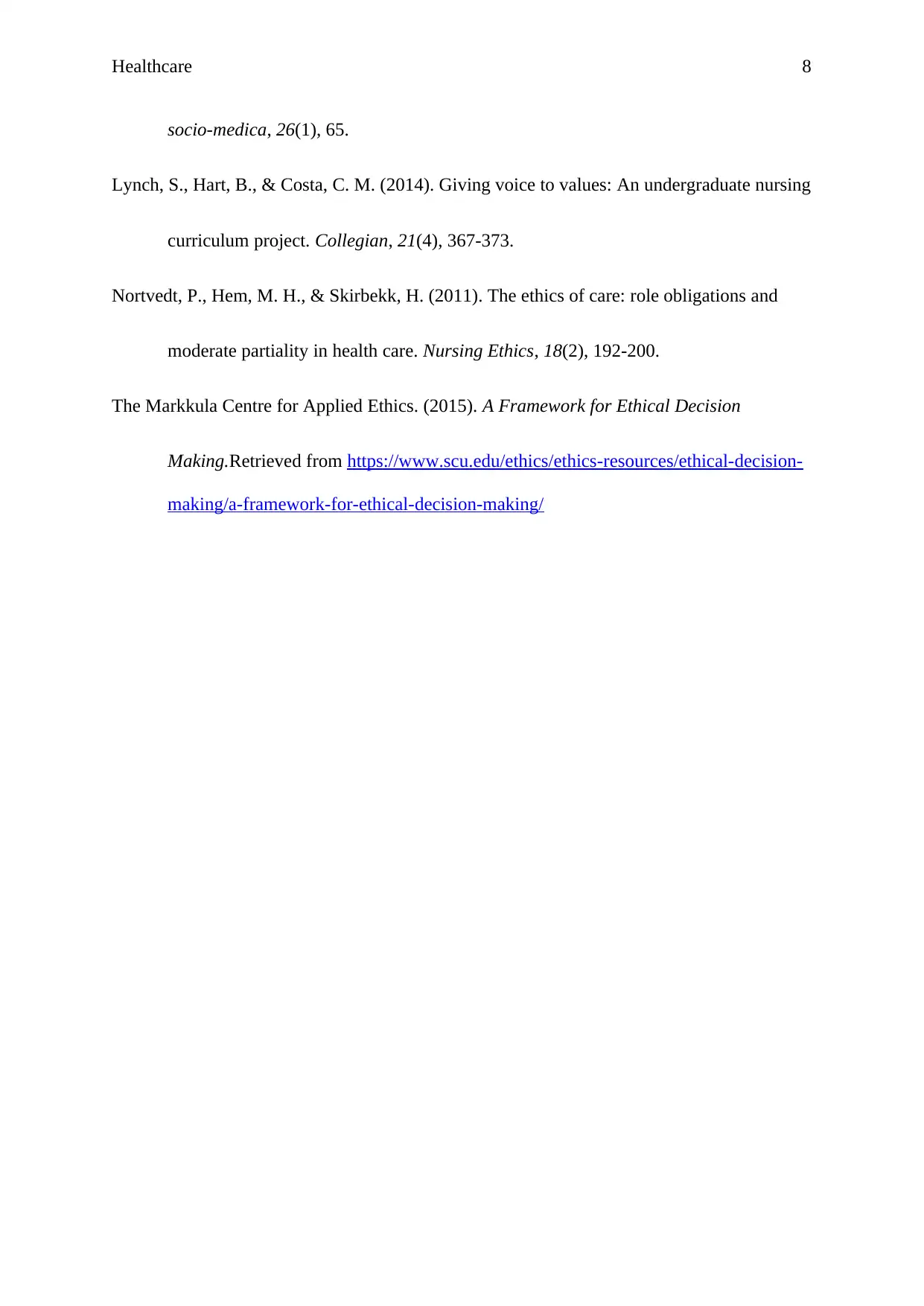
Healthcare 8
socio-medica, 26(1), 65.
Lynch, S., Hart, B., & Costa, C. M. (2014). Giving voice to values: An undergraduate nursing
curriculum project. Collegian, 21(4), 367-373.
Nortvedt, P., Hem, M. H., & Skirbekk, H. (2011). The ethics of care: role obligations and
moderate partiality in health care. Nursing Ethics, 18(2), 192-200.
The Markkula Centre for Applied Ethics. (2015). A Framework for Ethical Decision
Making.Retrieved from https://www.scu.edu/ethics/ethics-resources/ethical-decision-
making/a-framework-for-ethical-decision-making/
socio-medica, 26(1), 65.
Lynch, S., Hart, B., & Costa, C. M. (2014). Giving voice to values: An undergraduate nursing
curriculum project. Collegian, 21(4), 367-373.
Nortvedt, P., Hem, M. H., & Skirbekk, H. (2011). The ethics of care: role obligations and
moderate partiality in health care. Nursing Ethics, 18(2), 192-200.
The Markkula Centre for Applied Ethics. (2015). A Framework for Ethical Decision
Making.Retrieved from https://www.scu.edu/ethics/ethics-resources/ethical-decision-
making/a-framework-for-ethical-decision-making/
1 out of 8
Related Documents
Your All-in-One AI-Powered Toolkit for Academic Success.
+13062052269
info@desklib.com
Available 24*7 on WhatsApp / Email
![[object Object]](/_next/static/media/star-bottom.7253800d.svg)
Unlock your academic potential
Copyright © 2020–2026 A2Z Services. All Rights Reserved. Developed and managed by ZUCOL.





